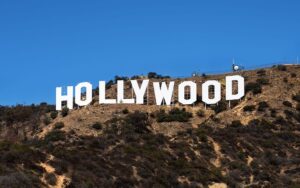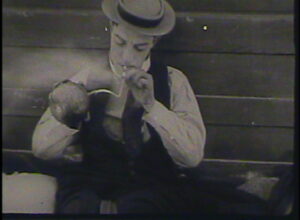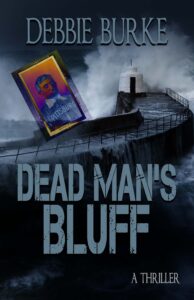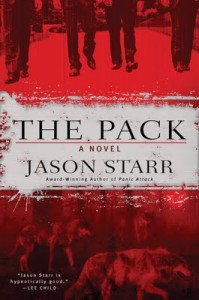By Debbie Burke
Please welcome today’s Brave Author who’s submitted the first page of a historical Crime Novel. Give it a read then we’ll discuss it.
~~~
Donny Malone
Larry began eating at Vicenzo’s after his last picture went bust and his fourth wife fled with the remaining cash. It was a cheap breakfast joint off Santa Monica’s Broadway and Sixteenth. A SWELL LITTLE JOINT, he wrote Howard Miller in a telegram arranging the meeting.
Miller was one of those full-time writers on the payroll at Paramount. Swell kid. Owed Larry too. Back in seventeen, Larry accepted Miller’s romance script titled: The Loving Call. Anyway, cut a long story short, the picture made money. Big money. Made Howard Miller a star. Or as much a star as its possible to be for a writer. Still, he had the manner of a kid from the Bronx, old Howie. He’d still roll up his sleeves when the L.A. sun hit noon. He’d still greet a guy with a firm, two-handed grip, and look any maître d’ in the eye without flinching. Howard weren’t into none of that small talk baloney neither. Soon as Vicenzo filled the coffees, he got down to talking shop.
“So Larry,” he asked. “How’s the kid?”
He was asking about Malone.
“Donny’s swell. Donny’s Donny.”
“Cos last I heard, Malone burnt his bridge back to vaudeville.”
“Donny’s done with that vaudeville hooey. Gets into L.A. tomorrow. Donny’s big time.”
“I hope you’re right.” Howard sighed, shaking his head. He dropped two sugar cubes into his coffee. Gave it a stir with his finger. “Since Malone gets his kicks making Mackenzie Campbell out like a chump.”
“Mack’s done. Donny’s contract was up.”
“I’m talking about Mack’s wife.”
“They were done.”
“Done, Larry? You think Campbell – Campbell – is letting Malone cross the country with that broad?”
Larry didn’t know what Mack had planned. Never thought to wonder. All he knew was Donny Malone didn’t belong in no dying nineteenth-century circus act. This was a kid who could jump from a railway bridge onto a series of fast-moving carriages. Who would do it in a hot minute for a twenty-cent bet. A kid with the acrobatics of Buster Keaton. The dashing victory-smile of Fairbanks. And Larry wasted no time telling him. Put on his Hollywood voice and told the kid straight. Told him, ‘Donny. Baby. You ain’t signing with that bum another season.’
“So what he say?” Howard asked.
~~~
Let’s start with the title. On its own, Donny Malone isn’t intriguing. I immediately thought of the 1997 film Donnie Brasco with Johnny Depp and Al Pacino. Unless a person is famous or notorious, a name doesn’t generally make a good title because the reader doesn’t yet understand the reference. A better title could hint at the bygone era of Hollywood that might attract readers who enjoy the noir genre.
This first page does a nice job echoing conventions of pulp fiction and noir. A telegram sets the time as early to mid-20th century in Santa Monica. The language is sharp, crisp, and slangy, further setting the period tone.
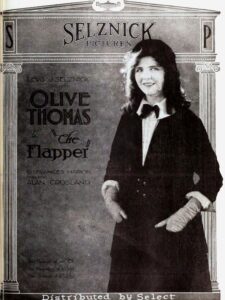 Brave Author introduces Larry who’s down on his luck, reduced to eating at a dive café after suffering professional and personal misfortunes in the Hollywood film industry.
Brave Author introduces Larry who’s down on his luck, reduced to eating at a dive café after suffering professional and personal misfortunes in the Hollywood film industry.
Howard Miller’s character is established with backstory (more on that in a moment) as a successful Paramount screenwriter who is indebted to Larry. The inference is that Larry contacted Howard to call in a favor since Larry’s career is evidently languishing.
The subject of their conversation is an unseen third character, actor Donny Malone, followed quickly by the introduction of two more unseen characters: Mackenzie Campbell and Campbell’s wife with whom Donny has or had a relationship. Campbell is apparently not someone to mess with, raising a possible threat to Donny. The reference to an expired contract indicates Donny and Campbell once had legal obligations to each other but that’s now over.
The potential for conflict is present, although the reader isn’t sure yet what the conflict is. For the reader to fully engage with the story, s/he needs to understand the relationships among characters and what their opposing goals or agendas are. Suggest you fill in those aspects quickly in the pages that follow.
The lead-off sounds promising but I see four issues that need work.
First problem: What is Larry’s profession? He’s in the Hollywood film business but in what capacity—producer, director, talent agent, actor, writer? The lack of that knowledge makes it difficult to pin down what he wants and what he hopes to accomplish by meeting Howard. It sounds as if Larry might represent Donny as his talent agent but that’s not clear.
The character sketch of Howard is well done. Describing him as a “swell kid” reinforces appropriate slang of the era. “Back in seventeen” narrows down the time closer to the 1920s.
However, it also highlights the second problem: most of that paragraph is an information dump about Howard. After the line “Still, he had the manner of a kid from the Bronx, old Howie” I suggest you cut the rest of the paragraph and save it for later in the story.
The following lines confused me:
Soon as Vicenzo filled the coffees, he [which he? Vincenzo or Howard] got down to talking shop.
“So Larry,” he [again, which he? Vincenzo or Howard] asked. “How’s the kid?”
Easy fix: Soon as Vicenzo filled the coffees, Howard got down to talking shop.
“So, [need comma] Larry,” he asked.
The mention of sugar cubes and Howard stirring coffee with his finger were wonderful little details that again reinforce the era. Fun fact: restaurants replaced sugar cubes with packets after World War II.
The third problem is yet another info dump, this time about Donny Malone.
“All he knew was Donny Malone didn’t belong in no dying nineteenth-century circus act. This was a kid who could jump from a railway bridge onto a series of fast-moving carriages. Who would do it in a hot minute for a twenty-cent bet. A kid with the acrobatics of Buster Keaton. The dashing victory-smile of Fairbanks. And Larry wasted no time telling him. Put on his Hollywood voice and told the kid straight. Told him, ‘Donny. Baby. You ain’t signing with that bum another season.’”
While the description of Donny is compelling and shows he has great star power, it’s still an info dump.
Don’t feel bad, Brave Author. We all struggle with finding the right balance between telling just enough background information to orient the reader and over-telling that halts the story’s forward movement.
Also, if this whole paragraph is Larry’s thoughts, the transition back to the conversation with Howard is a bit bumpy. ‘Donny. Baby. You ain’t signing with that bum another season’. Because of the single quotes around these sentences, I had to reread to determine if Larry is reviewing the conversation in his head or if he’s telling Howard about it.
In the passage below, Larry and Howard are already talking about Donny:
“Donny’s swell. Donny’s Donny.”
“Cos last I heard, Malone burnt his bridge back to vaudeville.”
“Donny’s done with that vaudeville hooey. Gets into L.A. tomorrow. Donny’s big time.”
“I hope you’re right.” Howard sighed, shaking his head. He dropped two sugar cubes into his coffee. Gave it a stir with his finger. “Since Malone gets his kicks making Mackenzie Campbell out like a chump.”
“Mack’s done. Donny’s contract was up.”
“I’m talking about Mack’s wife.”
“They were done.”
“Done, Larry? You think Campbell – Campbell – is letting Malone cross the country with that broad?”
Why not continue the conversation and incorporate Larry’s thoughts about Donny into dialogue?
Here’s a different way to convey the info:
Larry didn’t know what Mack had planned. Never thought to wonder.
One side of Howard’s mouth pulled down, unconvinced.
Larry leaned close and put on his Hollywood voice. “Listen, Howard, for a twenty-cent bet, this kid will jump from a railway bridge onto a fast-moving train. He’s every bit as good an acrobat as Buster Keaton. Plus, he’s got that Fairbanks smile. I didn’t waste no time telling him straight. ‘Donny. Baby,’ I says, ‘you ain’t signing with that Campbell bum another season.’”
The reader still doesn’t know exactly what’s happening or what conflicting agendas are in play among Larry, Howard, Donny, Campbell, and Campbell’s wife. But enough hints have been provided to promise the reader that fireworks are ahead.
The fourth problem is point of view. It feels off. Sometimes the voice sounds as if an unseen narrator is telling the reader about Larry rather than Larry thinking to himself.
Vintage films often used voice-over narration to explain context and introduce characters. A prime example is the 1944 classic Laura where Clifton Webb talks to the audience about her murder. If this is the effect Brave Author is striving for, it doesn’t quite succeed.
Currently, readers favor deep point of view, inside the main character’s skin, thinking his thoughts, experiencing his sensations and physical reactions. Yet that doesn’t feel quite right for this historical piece.
So I confess I’m stumped how to handle POV except to suggest that Brave Author study classics written during this time period to pinpoint how those authors treated POV to achieve their tone. If TKZers have other ideas, please chime in.
There are minor problems with word repetitions and typos:
“Or as much a star as it[‘]s possible to be for a writer.” I smiled at the humorous observation that the writer is definitely at the bottom of the movie industry food chain.
The word “swell” is used three times on the first page. If “swell” is a verbal tic Larry falls back on when he’s nervous, three times might be okay but more than that may wear thin with readers. Perhaps change one to a similar slang term for the era, e.g. Vincenzo’s is the bee’s knees. Same suggestion applies to “joint,” used twice in the first paragraph. And “still,” used three times in the second paragraph.
The last line So what he say? might be slang but could also be a typo. So what‘d he say? sounds more natural.
Overall, this page is well written and captures the time, speech patterns, and period slang in a style that’s reminiscent of noir pulp fiction. The reader doesn’t yet understand the story problem or what’s at stake. However, the historic setting and the voice are intriguing enough that I’m willing to read on to discover if Larry is a sour-grapes loser, a hustler seeking a shortcut back into the big time, a determined guy who refuses to give up, or someone else. Knowledge of his profession would help frame his personality.
This promises to be an entertaining trip into the gilded age of Hollywood where treachery lurks beneath the glamorous veneer.
BTW, Jim Bell has discussed pulp fiction and noir here. On Patreon, he offers short stories set immediately after World War II about a studio fixer in the Hollywood film industry. You might check out how our resident expert handles his first pages.
Best of luck to you, Brave Author. You’re off to a good start.
~~~
TKZers: What do you think of Donny Malone? What suggestions can you offer our Brave Author? How would you handle POV?
~~~
Debbie Burke’s new thriller, Dead Man’s Bluff, is on sale at the introductory price of only $.99. Please check out the link here.

